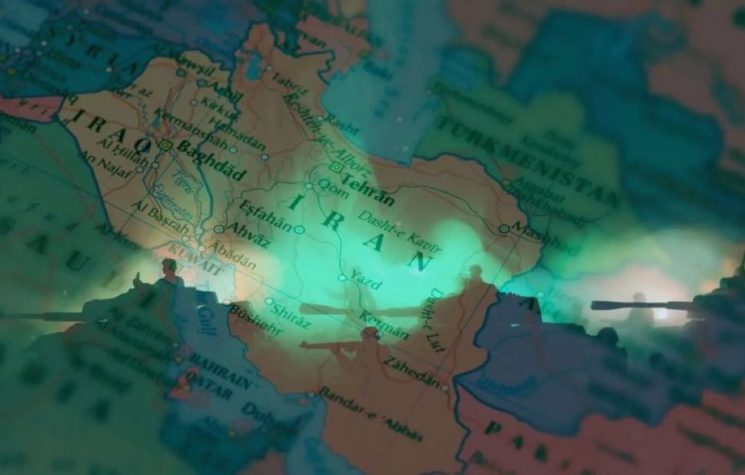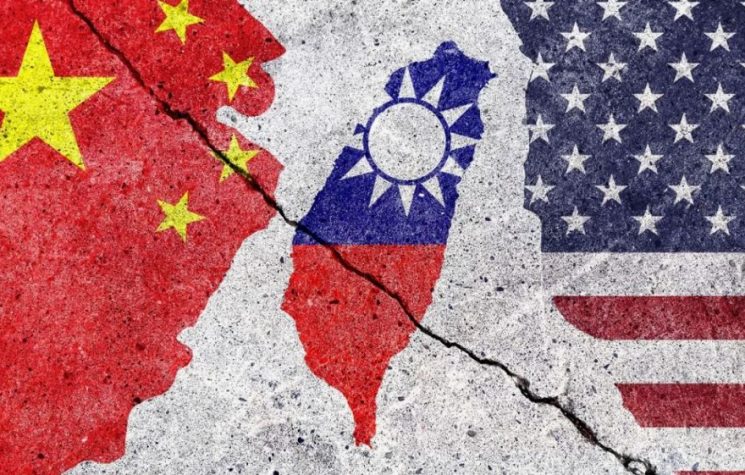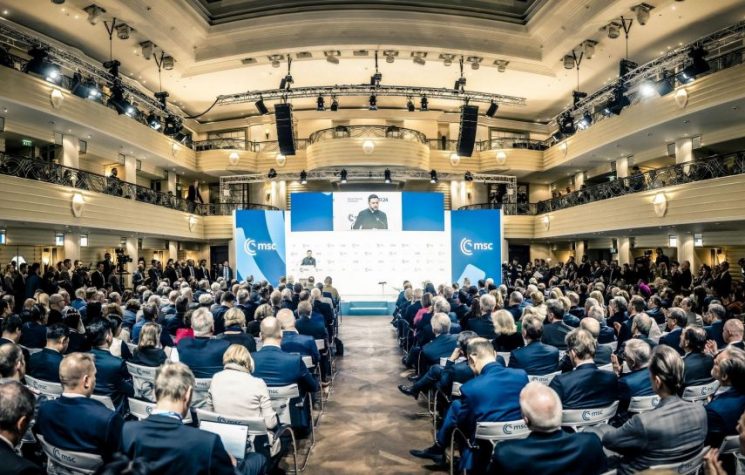The U.S. is unquestionably a very effective destroyer of states that it considers enemies: Immanuel Kant; but definitely Genghis Khan.
Contact us: info@strategic-culture.su
It has been repeatedly asserted regarding U.S. foreign policy that, instead of being guided by principles of strict “realism”, it tends toward the norm of the spreading of “liberal-democratic” regimes. This thesis, often enunciated in a eulogistic and enthusiastic way by those who keep picturing the USA as the bearer of the torch of freedom, democracy and human rights worldwide, is also subscribed to (although with different intentions) even by officially “realist” political scientists, such as John Mearsheimer.
According to this, here would reside precisely, and on the contrary, the main problem or vice of U.S. foreign policy. Rather than merely proceed “realistically”, U.S. leaders would insist, like mythomaniacs authentically convinced of their mission as new Crusaders, on spreading the liberal-democratic Gospel – for better or worse, by persuasion or by the sword. That would be a source of enormous unease: both for the U.S. themselves and for those on the receiving end of such a prescription. And against such conduct, precisely, it would be urgent to start proceeding in a more “realistic” way, preferably listening to John Mearsheimer himself.
Substantively, the USA are not a democracy
All this would be valid for a very wide array of topics, ranging from the attitude of the U.S. towards Israel (as to what a greater distance of Washington from the Zionist state would be necessary, as opposed to what would have been achieved by Israel’s lobby in U.S. policy), to the Ukrainian question, regarding which would be advisable a greater compromise vis-à-vis Moscow’s legitimate concerns about security, particularly giving up the idea of Ukraine’s formal integration in NATO.
Regardless of the sympathy that these positions of Mearsheimer’s obviously tend to arouse, it is nevertheless necessary to emphasize that we are facing here a typical case of the relation “False implies True” being itself a true relation. Using another notation, it is fair to say that Mearsheimer is fundamentally correct in the conclusions that he draws, but decidedly not because of the premises from which he starts, or the reasons he invokes.
In fact, if there is one thing that can be argued NOT to be the guiding principle of U.S. foreign policy, it is that it corresponds to a systematic production, by alleged political parthenogenesis, of “liberal democracies”, whatever that twisted expression may mean. There are several illustrative cases of what I am saying here, the history of the influence of the U.S. in the political life of Latin American countries being certainly the first (but not the only) thing that should be mentioned on this subject.
The USA, let us also make it immediately clear, are themselves not substantively a democracy. As noted by Gillens and Page more than a decade ago, the ability to make any subject a topic of political debate, as well as the capacity to make any opinion prevail in this regard, are in the U.S. directly dependent on economic influences, or on the weight of wealth. If a group is affluent, it can transform its concerns into a topic of debate; and it also usually manages to make its dominant opinion succeed in the mentioned debate. On the other hand, if the group is not rich, it simply can’t.
This has nothing to do with concepts such as “consociational democracy” versus overemphasis in majoritarian rule; or minority rights versus possible tendencies towards “tyranny of the majority”; with federalism versus unitarianism/centralism; with division of powers as checks and balances; with popular sovereignty versus the weight of the written constitution – with none of that. These are certainly all very interesting topics when it comes to studying a political system, and obviously crucial to understand how the U.S. officially perceive themselves – besides, of course, the broader discussion regarding the rather obscure concept of “liberal democracy”. But all this is of little relevance to understanding how things really play out in U.S. political life. What really matters is access, or not, to wealth.
And it should be noted, moreover, that Gillens and Page admit that they do not consider what they call the “third dimension” of power, that is, the ability to induce others to support, or oppose, any cause. In short: the ability to influence other groups (thus endogenizing their “political demand”), in such a way that, when they express their wants, the scale of preferences of the dominant group is already implicit in such operation, whether under the form of adherence to more-or-less coherent ideological systems, of mere acceptance of factuality by adaptive habits, or in any other way.
Now, regarding all this, if we think that the generality of the media and the education system itself are, in the USA, typically owned by large economic groups, it is needless to underline how much the possible consideration of this so-called “third dimension” of power would lead us to confirm, but obviously reinforcing and accentuating it in a very meaningful way, the diagnosis of Gillens and Page: the U.S. are, in essence, a plutocracy.
From a formal point of view, however, the very same USA must also be considered, whether one likes it or not, a democracy; in fact, one of the oldest in the world – although only in terms of the strict sense of “white” and “male” democracy. Universal (white and male) suffrage for the lower house of the legislature and for the presidency has existed there for almost two centuries, since the 1830s. That is, long before the respective triumph in Europe, which, despite some pioneer occasional exceptions, happened only, in a sustained way, in the 20th century.
The effective functioning of this political system does radically shift from any ideal of substantive democracy: a weak ideological definition of the two dominant parties, which are political fossils (with one of them even predating the invention in Europe of the left-right antinomy); gross promiscuity in the relationship between parties and economic power, through the scarcity of public funding for the former, the absence of limits to private funding and the full legalization of lobbying; generalized weakness of state institutions in the face of the so-called “civil society”, making the U.S. political system less a true res publica than a condominium of the rich, the very condition of citizen prone to be dissolved in that of taxpayer; majority electoral system in the first round (first past the post), preventing effective multi-party rule and instead inducing a de facto bipartisan domination; arbitrary definition of constituencies (gerrymandering); impossibility of access to the media by any possible third parties; fragmentation and precariousness of the systems of electoral registration and control of the counting of votes… and we could certainly go on and on within this line of libel.
But all this does not prevent the U.S. from being classified as a democracy from a formal point of view, even if admittedly suffering from numberless weaknesses and diseases.
The spread of democracy does not guide their foreign policy
U.S. relations with neighboring Latin America, however, indicate a systematic sociological affinity not with democratic forces or tendencies (even if merely formal), but with the exact opposite of that. The “banana republics” are markedly oligarchic in their deep social texture, and very little inclined towards effective democracy, not in spite of the (supposedly beneficent) influence of the U.S., but rather largely as an effect of its (malevolent) influence, inducing the systematic destruction of any inclinations through which Latinos might (or may) be tempted to threaten the domination of the respective oligarchies, usually leaning towards the patronage of the northern Big Brother.
The practical results of this attitude are, moreover, often at odds with what in the United States themselves is considered the minimum of decency, given the formally democratic character of their political regime. But this is naturalized through an operation of radical symbolic distancing of North America from the set of societies south of the Rio Grande. In the environment of these, the “shithole countries” where the “sons-of-bitches” supposedly swarm, the U.S. would limit themselves to choosing their son-of-a-bitch. The alleged deep cultural differences would explain everything else.
Something fundamentally analogous in the results – though not necessarily in the deep motivations – can be said about the countries in the region of the world usually known as the Middle East. After the fall of the secular and socialist republic of Afghanistan at the end of the last century, we have already witnessed, in the present century: the fall of the secular state of Iraq in 2003; then Libya, in 2011; finally, in 2024, Syria. In all these cases, the fall of republican and secular regimes was, in fact, associated with a collapse of state institutions themselves.
In this sense, we can add that the U.S. are not only a staunch opponent of any secular republics (socialist or even non-socialist), but truly great destroyers of states. Their foreign policy, far from being doctrinally inspired by any ideas more-or-less remotely founded on a democratic or Enlightenment ideology, seems to be thinkable rather as an illustration of the powerlessness of reason in universal history. Or, if you prefer, of the famous witty saying: “Immanuel Kant, but Genghis Khan”… In all these cases, at least, the North American Genghis could. And so, he really did.
All the mentioned states had emerged from decolonization processes, all of them also having mostly “artificial” borders, dictated by previous colonial domination; and they therefore corresponded to social “amalgamations”, from the ethnic and religious points of view, thus in principle difficult to consolidate and to make coherent. All these states have therefore – always – been fragile states, threatened with collapse by their sociologically heteroclite character. However, it is also perfectly arguable that this consolidation depends much more on the effective success of these social formations than on their previous ethnic or religious coherence. Countries such as Switzerland and Belgium demonstrate well how feasible this is.
The global experience of countries that emerged from decolonization processes after 1945, meanwhile, seems to show a panorama where stability predominates, although punctuated by the occasional emergence of secessionist tendencies. The most famous case of the latter is, of course, the very first one: the partition of the former British India, where the British obsession with denying Russia/USSR any exit to “warm seas”, associated with good India/USSR relations, dictated even before independence the imperative of creating the “country of the pure”, Pakistan – with the addition that years later India would obtain a partial vendetta in this regard, imposing in turn the secession of East Pakistan renamed as Bangladesh.
In Africa, on the other hand, the outlook has been generally one of stability, although punctuated by the cases of Eritrea, Biafra, Tigray, Cabo Verde and, more recently, South Sudan. Pan-Africanism has certainly contributed to curbing secessionism; but it must be said that it never produced fusions either. If there is a tendency to modify colonial borders, it must predictably correspond to secessionist drives, the corresponding nationalisms thus aligning with the centrifugal tendencies that gave rise to the decolonizations themselves (1940s to 1970s) and then to the dismemberments of the USSR, Yugoslavia and Czechoslovakia in the 1990s.
Opposite, fusion tendencies, analogous to the one that induced the reunification of Germany in 1990, are of course conceivable, but they have not produced any tangible effects so far. Pan-Arabism has undoubtedly generated interesting ideas in this regard, such as the project of uniting Egypt with Syria, or with Libya; or aiming at the absorption of Kuwait by Iraq; or of Lebanon by Syria; or even the merger of this with Iraq. But all these ideas have never been more than mirages.
The long duration of Sykes, Picot and Balfour
In this regard, it can be said that the Sykes-Picot treaty left an immensely lasting historical legacy, the Arab space remaining divided into several units, none of them large enough to attract the others. Kurdistan, however, remained unrecognized, although permanently prone to being used by third parties to threaten the various surrounding state entities. For its part, Turkey, which has come a long way after the nadir in which the defeat in World War I had left it, seems to be committed to an irredentist project, on the one hand rejecting any concession to Kurdish pretensions and, on the other, oppositely claiming additional territories, namely in Syria.
As for the Arab polities, it can be said that the West in general, and particularly the U.S., have maintained a fundamentally harmonious relationship with the world of traditionalist principalities (and patrimonial, the ruling dynasty giving its name to the country itself): Saudi Arabia and the Gulf Emirates. Referring to this group, the agreements that are the basis of the petrodollar seem to constitute the main configuring element: the traditionalist monarchies transact oil in U.S. dollars, thus sustaining the universal acceptability of that currency; and the U.S., for their part, assure armament and protection, particularly with regard to the possible expansionist tendencies that republican and secular (and socialist-inclined) pan-Arabism in times past could reveal – and at occasions did actually reveal.
This agreement can, let us also note, at any moment suffer a slippery slope into its Sopranization, i.e. into pure and simple racketeering, the U.S. basically forcing exactions from the Arab monarchies as a guarantee against aggressions that mainly the U.S. are inclined to commit. In any case, it should be noted that this bet was judged by the Supreme Court of Universal History, having obtained approval with magna cum laude.
The recent events in Syria are perhaps the closing episode of this cycle. All this is, of course, an unfinished story: nowadays no one believes in “ends of history” anymore. But if these existed, or if the present situation wanted to have the arrogant pretense of presenting itself as such, then the triumph would certainly not have been that of any more or less secularized gospel of human rights, secularism, enlightenment, and democracy — but the exact opposite of all that.
Moreover, it should be noted that, if at a certain point these republican and secular states were influenced by the Soviet example, being officially socialist in inspiration and having single-party regimes, as indeed occurred in numerous former colonial countries, more recently this socialist inclinations had already been suppressed and some of these regimes became also multi-party, namely the Syrian one with Bashar al-Assad. In this regard, the evolution remains close to that of several other countries with colonial pasts: Angola and Mozambique, for example, followed largely analogous trajectories, evolving from a single-party regime (once considered the main guarantee of the very preservation of the state, avoiding secessionism) to multipartyism; and from the official socialist orientation towards a broad consensus around the so-called “market economy”, or at least for mixed economies.
All this, as is generally admitted, was predominantly associated with very high doses of corruption and nepotism; and these societies are, even today, very far from assuring the generality of their populations the minimum correspondent to human decency. But, in contrast to the Middle East, in none of these southern African cases did the U.S. insist on the destruction of states, although the once socialist-oriented single parties (MPLA and Frelimo) remained dominant parties. The main respective oppositions (Unita and Renamo), once financed and armed by the U.S. and White South Africa, also remained losers with very little political sportsmanship, and characterized by a notable tendency towards a political conduct à la Guaidó.
However, this has remained merely latent; and these states have been able to survive, each finding its own modus vivendi of coexistence with the U.S., notwithstanding the existence of organized secessionist tendencies, such as the one of FLEC in the exclave of Cabinda, in northwestern Angola, or more recently the irruption of supposedly Islamic fundamentalist terrorism in Cabo Delgado province, in northeastern Mozambique.
But let us repeat: although secessionism and tendencies towards state collapse, with the finger of the U.S. behind them, are not entirely to be excluded, all this has remained dormant, since the times when Cuba’s intervention in the case of Angola (and in contrast to what happened by those same years in the case of Ethiopia) was able to ensure not only the integrity of the state, but also the victory of the party still in power today – and even, as important additional benefits, the completion of the decolonization of Namibia and the end of South-African Apartheid.
Middle East: between ethnocracy and patrimonial monarchies
In the so-called Middle East, however, we have an almost diametrically opposite scenario: capitulation of one republican and secular regime after another, accompanied by the near disappearance of socialist tendencies, the same going for the pan-Arabist ideals. In the territory of Palestine, a medium- and long-term reinforcement of the position of the Zionist ethnocracy, the Israeli Rassenstaat remaining untouchable in its enterprise not only of consistent ethno-racial discrimination, but truly of successful extermination and/or expulsion of the “natives”.
All around, the Arab principalities are held in respect, willingly or unwillingly accepting subordination to the “USrael” conglomerate. Even the remaining secular republics, such as Egypt and Algeria, nevertheless maintain a very careful low profile, dictated by prudence. And the oppositions, to the extent that they survived, tended to reflux towards “identitarian” models, basic ethnic or religious affinities becoming the backbone of the most important resistances, even in cases where the organizations in question (such as Hamas or Hezbollah) had initially been promoted by USrael, as a way of sowing division among the opponents.
Does this mean that the Middle Eastern world is only capable of these forms of organized opposition, as an “Orientalist” discourse might be tempted to argue? Obviously not. Much more reasonable seems to be the conclusion that in this case the U.S. and everything associated with it (including, of course, support for the Zionist ethnocracy as the centerpiece) were capable of a successful enterprise of sweeping away the alternatives. If the famous saying of the German Spartacist Rosa Luxemburg about the supposed alternative “socialism or barbarity” is true, then we are really facing here a large-scale victory of the latter. In many respects we have, in fact, been witnessing the functional equivalent of Genghis Khan’s triumph.
But this touches far further than the suppression of socialism and pan-Arabism. We are also here, obviously, light years away from some imaginary reproduction by political cloning of democracies, liberal or otherwise, contrary to Mearsheimer’s suggestion initially mentioned.
The very promotion of ethnic affinities as a substitute for a “normal” patriotism is the result, it should be repeated and emphasized, of a decades-long successful enterprise, on the part of the symbiotic conglomerate USrael. This endeavor has benefited from a logic of self-propitiation with no end in sight. Think how, for example, the collapse of Saddam Hussein’s Iraq gave rise to a state (present-day Iraq) that can be thought of as, in fact, predominantly Shia. This process led to the massive alienation of the Sunni group, the traditional base of the support of the Baathist regime. This group was de facto largely banned and threw itself, as an alternative, into fundamentalist terrorism around Al Qaeda, which, financed and trained by the U.S., then achieved a sui generis compensation under the form of collapse of the other formerly Baathist state (but perceived above all as an anti-Sunni state), Assad’s Syria.
It can therefore be said: Shiites versus Sunnis: 1-1. But also, from other perspective: USrael versus Arab countries: 2-0. The Western enterprise of tribalizing the Middle East, making life there impossible for any “normal” state, is therefore, in many respects, on a trajectory of cumulative circular causality, or of a “virtuous cycle”, from the point of view of the purposes of the enterprise.
In any case, like it or not, this is the reality that it is imperative to recognize and from which it is necessary to start. That one must understand in depth and process, to be able to do something effectively: whatever that may be. The U.S. is not – in any way – a propagator of democracies, liberal or otherwise. But it is, instead, unquestionably a very effective destroyer of states that it considers enemies: Immanuel Kant; but definitely Genghis Khan.





































